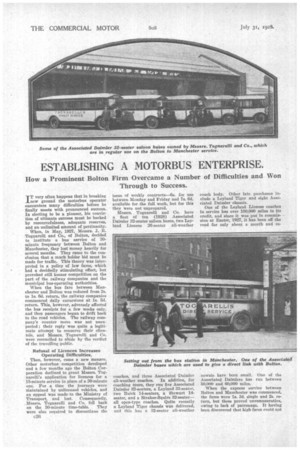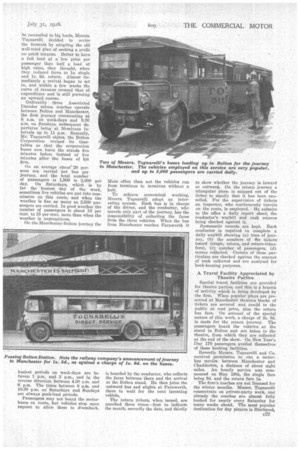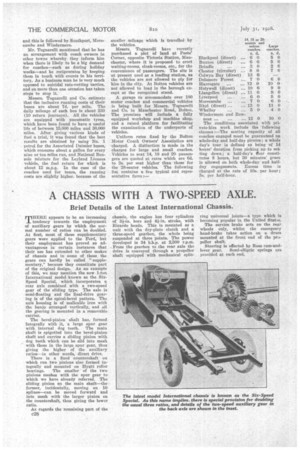ESTABLISHING A MOTORBUS ENTERPRISE.
Page 46

Page 47

Page 48

If you've noticed an error in this article please click here to report it so we can fix it.
How a Prominent Bolton Firm Overcame a Number of Difficulties and Won Through to Success.
IT very often happens that in breaking new ground the motorbus operator encounters many difficulties before he finally meets with pronounced success. In electing to be a pioneer, his conviction of ultimate success must be backed by resourcefulness, adequate reserves, and an unlimited amount of pertinacity.
When, in May, 1927, Messrs. J. R. Tognarelli and Co., of Bolton, decided to institute a bus service of 30minute frequency between Bolton and Manchester, they lost money heavily for several months. They came to the conclusion that a much bolder bid must be made for traffic. This theory was interpreted in a policy of low fares, which had a decidedly stimulating effect, but provoked still keener competition on the part of the railway companies and the municipal bus-operating authorities.
When the bus fare between Manchester and Bolton was reduced from 2s. to 1s. 6d. return, the railway companies commenced daily exellreODS at is. 5d. return. This, however, adversely affected the bus receipts for a few weeks only, and then passengers began to drift back to the road vehicles. The railway company's counter move was not unexpected; their reply was quite a legitimate attempt to conserve their clientele, and Messrs. Tognarelli and Co. were reconciled to abide by the verdict of the travelling public. _
Refusal of Licences Increases Operating Difficulties.
Then, however, came a new menace. Other motorbus competition developed and It few months ago the Bolton Corporation declined to grant Messrs. Tognarelli's application for licences for a 15-minute service in place of a 30-minute one. For a time the journeys were maintained by unlicensed vehicles, and ail appeal was made to the Ministry of Transport, and lost. Consequently, Messrs. Tognarelli and Co. fell back
on the 30-minute time-table. They were also required to discontinue the G26 issue of weekly contracts-6s. for use between Monday and Friday and 7s. 6d. available for the full week, but for this they were not unprepared.
Afessrs. Tognarelli and Co. have a fleet of ten (1928) Associated Daimler 32-seater saloon buses, two Leyland Lioness 26-seater all-weather
coaches, and three Associated .Daimler all-weather coaches. In addition, for coaching tours, they run five Associated Daimler 32-seaters, a Leyland 33-seater, two Buick 14-seaters, a Stewart 14seater, and a Straker-Squire 32-seater--all open-type coaches. Quite recently a Leyland Tiger chassis was delivered, and this has a 32-seater all-weather
coach body. Other late purchases include a Leyland Tiger and eight Associated Daimler chassis.
One of the Leyland Lioness coaches in service has over 100,000 miles to its credit, and since it was put in commission at Easter, 1927, it has been off the road for only about a month and re newals have been small. One of the Associated Daimlers has run between 50,000 and 60,000 miles.
When the express service between Bolton and Manchester was commenced, the fares were is. 3d. single and 2s. return, but these proved unremunerative, owing to lack of patronage. It having been discovered that high fares could not be reconciled to big loads, Messrs. Tognarelli decided to revise the formula by adopting the old well-tried plan of seeking a profit on quick returns. Better to have a full load at a low price per passenger than half a load at high rates, they thought, when they reduced fares to 1s. single and Is. (id. return, Almost immediately a revival began to set in, and within a few weeks the curve of revenue crossed that of expenditure and is still pursuing an upward course.
Ordinarily three Associated Daimler saloon coaches operate between Bolton and Manchester, the first journey commencing at 8 a.m. on week-days and 9.30 a.m. on ;Sundays, sulik.quent departures being at 30-minute intervals up to 11 p.m. Recently, Mr. Tognarelli states, the Bolton Corporation revised its timetables so that the corporation buses now leave the stands five minutes before instead of five minutes after the buses of his firm.
On an average about 20 persons are carried per bus per journey, and the total number of passengers is 1,500 to 2,000 per day. On Saturdays, which is by far the 'busiest day of the week, sometimes five vehicles are put into commission on this route, and when the weather is fine as many as 2,500 passengers are carried. In good weather the number of passengers is about 10 per cent. to 15 per cent, more than when the weather is unpropitious.
On the Manchester-Bolton journey the busiest periods on week-days are between 1 p.m. and 3 p.m., and in the reverse direction between 4.30 p.m. and 6 p.m. The times between 8 p.m. and 10.30 p.m. on Saturdays and Sundays are always peak-load periods.
Passengers may not board the motorbuses en route, but vehicles stop upon request to allow them to disembark. More often than not the vehicles run from terminus to terminus without a halt.
To achieve economical working, Messrs. Tognarelli adopt an interestinssystem. Each bus is in charge of the driver, and the conductor, who travels only part of the journey, has the responsibility of collecting the fares from the three vehicles. When the bus from Manchester reaches Farnworth it
is boarded by the conductor, who collects the fares between there and the arrival at the Bolton stand. He then joins the outward bus and alights at Farnworth, there to wait for the next incoming vehicle.
The return tickets, when issued, are punched three times—first to indicate the month, secondly the date, and thirdly to show whether the journey is inward or outward. On the return journey a triangular piece is snipped out of the ticket to signify that it has been cancelled. For the supervision of tickets an inspector, who continuously travels on the route, is employed. He submits to the office a daily report sheet, the conductor's waybill and cash returns being checked against it.
Systematic records are kept. Each conductor is required to complete a daily waybill showing (a) time of journey, (b) the numbers of file tickets issued (single, return, and return-transfers), (c) number of passengers, (d) money collected. Certain of these particulars are checked against the amount of cash collected and are analysed for book-keeping purposes.
A Travel Facility Appreciated by Theatre Parties,
Special travel facilities are provided for theatre parties, and this is a branch of activity which is being developed by the firm. When popular plays are presented at Manchester theatres blocks of tickets are secured and resold to the public at cost price, plus the return bus fare. On account of the special nature of this work, a charge of 2s. 6d. is made for the return journey. The passengers board the vehicles at the stand in Bolton and are taken to the theatre, from which they are collected at the end of the show. On New Year's Day 170 passengers availed themselves of these booking facilities.
Recently Messrs. Tognarelli and Co. received permission to run a motorbus service between Manchester awl Chadderton, a distance of about eight miles. An hourly service was commenced on May 19th, the single fare being 9d. and the return fare is.
The firm's coaches arc not licensed for the winter, months. Messrs. Tognarelli concentrate on private-party work, and already the coaches are almost fully booked for nearly every Saturday for many weeks ahead. The most popular destination for day picnics is Blackpool, and this is followed by Southport, Morecambe and Windermere.
Mr. Tognarelli mentioned that he has an arrangement with coach owners in other towns whereby they inform him when there is likely to be a big demand for coaches—such as during holiday weeks—and he reciprocates by keeping them in touch with events in his territory. As a business man he is very much opposed to suicidal rate-cutting tactics, and on more than one occasion has taken steps to stop it.
Messrs. Tognarelli and Co. estimate that the inclusive running costs of their buses are about 7d. per mile. The daily mileage of each bus is about 230 (10 return journeys). All the vehicles are equipped with pneumatic tyres, which have been found to have a useful life of between 15,000 miles and 30,000 miles. After giving various kinds of fuel a trial, it was found that the best results are obtained by using No. 1 petrol for the Associated Daimler buses, which consume about a gallon for every nine or ten miles run, and National Benzoic mixture for the Leyland Lioness vehicle, the fuel return for which is about 12 m.p.g. In the case of the coaches used for tours, the running costs are slightly higher, because of the smaller mileage which is travelled by the vehicles.
Messrs. Tognarelli have recently purchased a plot of land at Poets' Corner, opposite Victoria Station, Mancheater, where it is proposed to erect waiting-rooms, cloak-rooms, etc., for the convenience of passengers. The site is at present used as a loading station, as the vehicles are not allowed to ply for hire in the city. At Bolton vehicles are not allowed to load in the borough except at the recognized stand.
A garage to accommodate over 100 motor coaches and commercial vehicles is being built for Messrs. Tognarelli and Co. in Manchester Road, Bolton. The premises will include a fully equipped workshop and machine shop, and a raised platform for facilitating the examination of the underparts of vehicles.
Uniform rates fixed by the Bolton Motor Coach Owners' Association are charged. A distinction is made in the charges for large and small coaches. Vehicles to seat 14, 18 and 20 passengers are quoted at rates which are 6d. to 2s. per seat higher than those' for the 28-seater vehicles. The following list contains a few typical and representative fares :— ness ... 12 0 10 0
The conditions associated with mivate-hire work include the following clauses :—The seating capacity of all coaches engaged must be guaranteed on whole-day and half-day picnics ; a whole day's tour is defined as being of 14 hours' duration from picking up to setting down; a half-day's four constitutes 8 hours, but 30 minutes' grace is allowed on both whole-day and halfday engagements. Excess time is charged at the rate of 10s. per hour ; 5s. per half-hour.








































































































